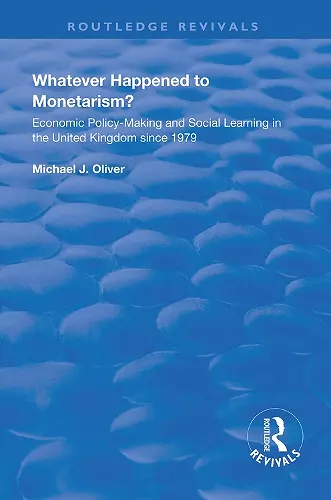Whatever Happened to Monetarism?
Economic Policy Making and Social Learning in the United Kingdom Since 1979
Format:Hardback
Publisher:Taylor & Francis Ltd
Published:5th Jun '19
Currently unavailable, and unfortunately no date known when it will be back
This hardback is available in another edition too:
- Paperback£8.99(9781138362666)

First published in 1997, this volume responds to the Conservative intention of conducting economic policy along monetarist lines after winning the General Election in May 1979. Michael J. Oliver argues that the monetarist strategy was rejected for several reasons during the 1980s, including the recession of the early 1980s, the change in attitude to the role of the exchange rate and disagreements between politicians and policy-makers. It is shown that the disputes between Chancellor Nigel Lawson, Lady Thatcher and her economic adviser, Sir Alan Walters, are central to explaining why macroeconomic policy-making evolved considerably from the mid-1980s.
This book is the first attempt by an economic historian to apply a social learning model to the post-1979 period. By adopting an inter-disciplinary approach, Oliver has made both an accessible addition to the debate on the conduct of economic policy since 1979 and a major contribution to the growing interest in social learning amongst social scientists.
’I am very glad that I have read this book... I recommend it to others’ Professor Gordon Pepper, City University Business School. ’An excellent, informed, and highly lucid summary of the macroeconomic developments since 1979’ Professor Kenneth Weiher, Prof of Economics, University of Texas, San Antonio ’Oliver’s study is greatly to be welcomed....’ Economic History Review
ISBN: 9781138362642
Dimensions: unknown
Weight: 540g
204 pages